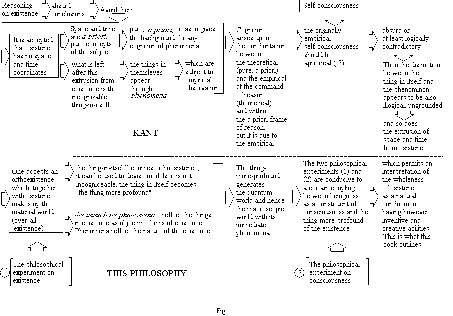This statement is fairly contradictory. Indeed,to recognize that
apperception is originally empiricalwhile contending that it is equally
a priori (pure) - asa prime pure cognition, independent of the
conditions of sensibleintuition- is unacceptable. Kant was forced to arrive at
thiscontradiction by his breaking the empirical from the pure rational,and this
separation was itself dictated by his view of space andtime as being apart from
objective existence. Whereas it is possible,at least conceptually, to separate
the empirical from the apriori rational over a fairly large space, to
split in apperceptionthe a priori rational and the empirical,
placing the apriori qua a priori before is untenable. Kant's whole
systemseems to stumble largely against apperception itself, against
self-consciousness. In the philosophical experiment of
self-consciousness*, the experiment is preceding. So,
inapperception or in self-consciousness, the experiment comes first,a fact of
which Kant was no doubt aware as he referred to it asprime empirical
apperception. Then the rational is immediatelyattached to this experiment in an
initial fusion, which appearsto be a philosophical experiment. However, by
separating reasonfrom experiment and assigning unjustified, groundless priority
to reason, Kant reaches the conclusion that "the empiricalconsciousness ...
is subject to a pure self-consciousness apriori ...
"10,which is
tantamount to saying that the empirical in consciousnessis no longer prime. We
can understand the inversion made by Kantbut this is doubtful. Indeed, we can
accept the priority of theoryover experiment as a mode of thinking but in the
case of self-consciousnessit is untenable. The treatment of apperception makes a
huge breachin Kant's system. Because of this inconsistency, space and timeare
ruled out as a priori forms and so the thing-in-itselfis also cast
away, leading to the collapse of Kant's whole system.The result may be noticed
in the succession of Kant's ideas, asshown in Fig.1, which indicates also the
way in which the outsetof his theory is invalidated.
While noting this inconsistency, we must recognizeKant's merit in having grasped
the importance of apperceptionas a reference aspect in any philosophy
of knowledge: "Thesynthetical unity of apperception is the highest principle
ofall exercise of the Understanding, of all logic, and then of transcendental
philosophy"**. This is both true and fundamental,
though the question shouldbe re-approached in terms of modern scientific
standards.
Kant extends the empiric - a priori dichotomy to the whole tract of
cognition - from the senses,to the understanding and consciousness - as it is
obvious from thepassage cited below: "The supreme principle of the
possibilityof all intuition***in relation to
sensibility was ... that all the manifold in intuitionbe subject to the formal
conditions of Space and Time. The supremeprinciple of the possibility of it in
relation to the Understandingis that all the manifold in it be subject to
conditions of theoriginal synthetical Unity of
Apperception"11.
The immediate question is what 'original and synthetic' takentogether mean.
'Original' meant empirical apperception, i.e. theempirical; the synthetical and
the original combined turn theoriginal into a priori. That the
empirical and the apriori become undistinguishable in the
"original-synthetic"is somewhat obvious, but Kant states that
apperception is apriori and re-instores the dichotomy: "The
transcendental****unity of apperception is called
objective, and must be distinguishedfrom the subjective unity of
consciousness, which is adetermination of the internal sense, by means
of whichthe said manifold in intuition is given empirically to be so united.
Whether I can be empirically conscious ... depends uponcircumstances,
or empirical
conditions"12.
Let aside the above-mentioned dichotomy, theinsight given in the last sentence
of the passage cited aboveis remarkable. Indeed, an empirical consciousness is
seldom attained,but it is stored as a sense-symbol and then as a sign-symbol
whichis then at work (see the essay "The experiment of consciousness"
herein).

Fig. 1
Let us now refer Kant'sview on what we understand by philosophical experiment.
From theentire human reality implied by the philosophical experiment,Kant
focuses only on reason. He thinks that the philosophicalexperiment is not pure
thought, since it may call our sensibilityinto play. He considers that reason
can necessarily become pureonly by abolishing sensibility. Indeed, our thinking
may striveto confine itself to a pure reason, although sensibility willbe
implicit because the truth-value of the results of reason cannotbe independent
of it. We can conceive things like the infinitenumber, time or space, which do
not necessarily correspond toreality. And this does not trouble our sensibility
at all. AsJohn Locke13
observed, we can imagine the infinite with all contradictionsentailed by this
notion.
*
Self-consciousness is regarded as a specific experimental fact in
chapter 7.
**
Kant's transcedental philosophy is the philosophy of the principles of pure reason,
of the mode of a priori cognition.
***
In Kant's view, intuition is the faculty of unmediated sense perception of a given
individual object.
****
I.e. pure, a priori.
The Limit of the Thing-in-Itself12






